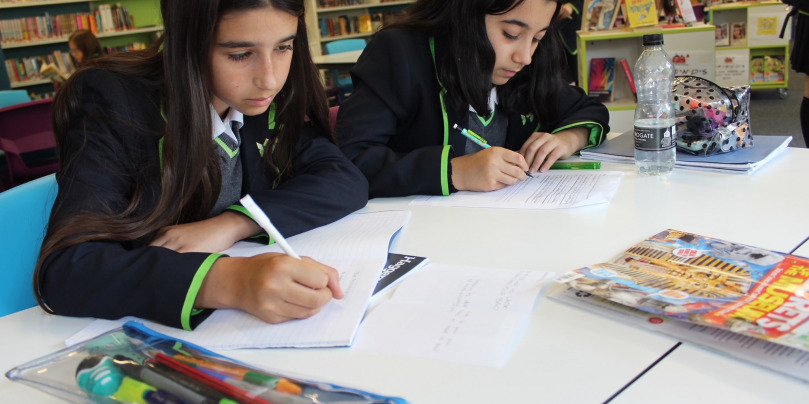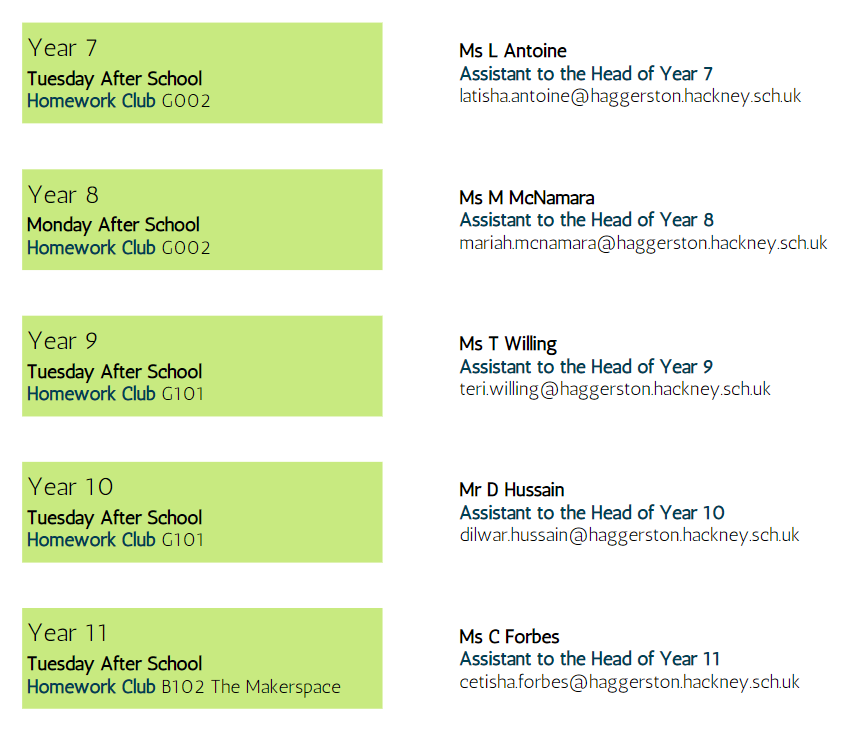
Homework and Extended Learning
In April 2020 The Education Endowment Foundation released a study on homework and concluded the following:
- Homework has a positive impact on attainment (on average +5 months), particularly with pupils in secondary schools.
- Some pupils may not have a quiet space for home learning – it is important for schools to consider how home learning can be supported (e.g. through providing homework clubs for pupils).
- Homework that is linked to classroom work tends to be more effective. In particular, studies that included feedback on homework had higher impacts on learning
- It is important to make the purpose of homework clear to pupils (e.g. to increase a specific area of knowledge, or to develop fluency in a particular area)
Why do we set homework?
Homework is work that is set to be done outside the timetabled curriculum. It contains an element of independent study in that it is not usually directly supervised by a teacher. At Haggerston School we believe that the regular setting and completion of homework is of vital importance in ensuring that every student achieves their full potential. Homework at Haggerston School will offer students opportunities to:
• Practice, consolidate and extend work covered in class or prepare for new learning activities
• Improve students’ attitude to learning and enhance their study skills e.g. planning, organisation, time management and self-discipline
• Learn to use resources not available in the classroom
• Develop research skills
• Take ownership and responsibility for learning and develop their independent learning skills
• Show progress and understanding
How can I support my child with homework?
All homework is set on DPR and students have been instructed to check DPR regularly. Students will be given clear instructions on how they should submit their homework, the estimated time the work should take and a due date. Homework tasks will be clearly explained and will include links to any resources students might need to complete the task.
Have a look at the below video to see what parents and students can do in DPR.
We also have created 2 user guides which you can view on the links below:
In addition, here are some top tips to support your child with their homework:-
• Agree a homework routine together.
• Make it clear that other activities such as watching TV, using the internet and phone calls will be possible after their homework is completed.
• Ensure, if possible, that your child has a comfortable, warm and light place to work, away from distractions and disturbances.
• Check your child’s planner for their homework details every evening.
• Help your child to pack their homework into their bag the night before it is due in.
How long should my child spend on homework?
Lower School – Years 7 & 8 Daily habits and routines
| Subject | Activity | Time |
| Maths | Sparx Maths (online programme) | 60 minutes per week |
| English | Reading | 30 minutes daily |
| Writing | 30 minutes per week | |
| Science | Knowledge practice using knowledge organiser and additional weekly homework set by teacher | 30 minutes per week |
| History and Geography | Self quizzing using knowledge organisers or alternative task set by teacher | 30 minutes per week on alternate weeks |
| Spanish | Vocabulary learning and testing using Quizlet (online programme) | 30 minutes per week |
In addition to the above, students will be set homework on the DPR in the following subjects as required: RE, Art, Music, Drama, Design Technology and Computing. They are likely to spend approximately one hour per week on additional subject work. In total, this should equate to approximately 1.5-2hrs of homework on weekdays for Lower School students
Upper School – Years 9-11 Daily habits and routines
| Subject | Activity | Time |
| Maths | Year 9 Sparx Maths (online programme) | 60 minutes per week |
| Years 10-11 Hegarty Maths practice (online programme) | 60 minutes per week | |
| English | Reading | 30 minutes daily |
| Writing | 60 minutes per week | |
| Science | Knowledge practice using knowledge organisers, revision guides and online programme and weekly homework (exam type questions) | 60 minutes per week |
| History and Geography | Self quizzing using knowledge organisers or alternative task set by teacher | 30 minutes per week |
| Spanish | Vocabulary learning and testing using Quizlet (online programme) | 30 minutes per week |
In addition to the above, Year 10 and 11 students will be set weekly homework on the DPR in their chosen option subjects. They are likely to spend approximately two hours per week on additional subject work. In total, this should equate to approximately 2-2.5hrs of homework on weekdays.
Sixth Form – Daily habits and routines
The most significant change for Post 16 students is the increase in independent work. Whether they are studying BTEC or A levels students are required to work more independently than ever before. There are no shortcuts to success and personal reading ‘around’ their subjects is one of the magic ingredients that will help them to achieve success. Therefore it is slightly harder to quantify the approximate time they will spend on independent work. As a general rule we recommend a minimum of 1 hour of independent work for every 1 hour of contact lesson time to achieve an A.
What homework clubs do we have in school?
Not all homework is done at home. In fact, for some students who find it hard to work at home, or for some tasks which may require resources (books, software, equipment) more readily available at school, it is necessary or desirable to carry out the task at school. Haggerston School provides homework spaces that all students can attend. All spaces are staffed and students have access to computers. Some students will be invited to attend these homework spaces to support their learning. If this is the case, you will be informed by the school.
Our homework spaces for each year group are:

All students can access our school library 8.30am – 4.30pm Monday to Friday where there is a study area and computers available.
What reading books do you recommend?
Students must have their own private reading book with them in their bag every day. Our library stocks a broad range of books, including study guides. We have a suggested reading list here which is a great start.






